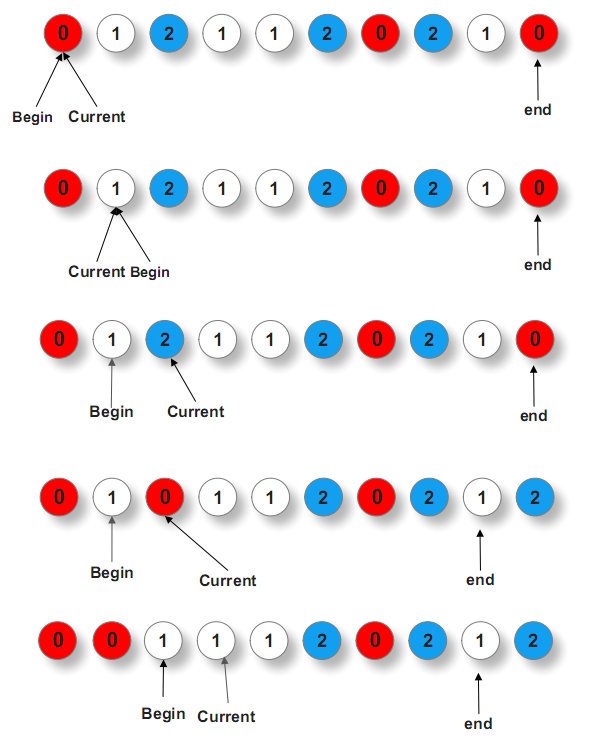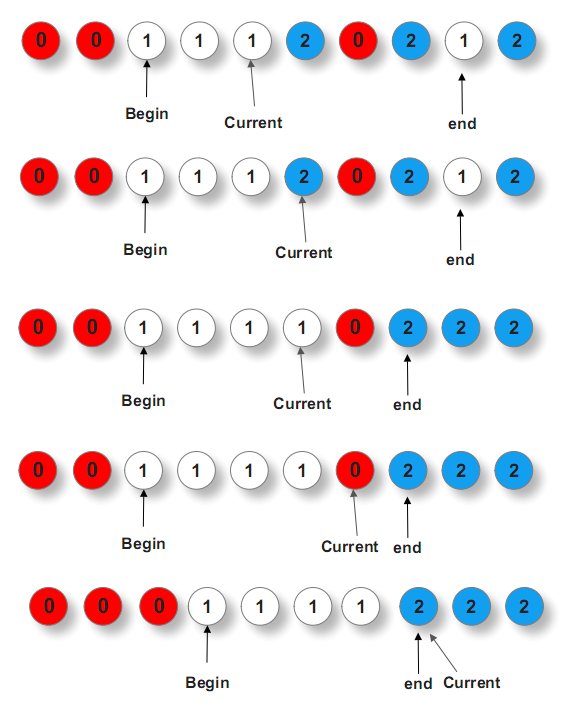三色球和荷兰国旗问题 分析 c语言代码详解
来源:互联网 发布:js发送短信验证码 编辑:程序博客网 时间:2024/05/01 12:03
此类问题,类似快排中partition过程。只是需要用到三个指针,一前begin,一中current,一后end,俩俩交换。
- current遍历,整个数组序列,current指1 current++,
- current指0,与begin交换,而后current++,begin++,
- current指2,与end交换,而后,current不动,end--。
1)若遍历到的位置为0,则说明它一定属于前部,于是就和begin位置进行交换,然后current向前进,begin也向前进(表示前边的已经都排好了)。
2)若遍历到的位置为1,则说明它一定属于中部,根据总思路,中部的我们都不动,然后current向前进。
3)若遍历到的位置为2,则说明它一定属于后部,于是就和end位置进行交换,由于交换完毕后current指向的可能是属于前部的,若此时current前进则会导致该位置不能被交换到前部,所以此时current不前进。而同1),end向后退1。
为什么,第三步,current指2,与end交换之后,current不动了列,对的,正如algorithm__所说:current之所以与begin交换后,current++、begin++,是因为此无后顾之忧。而current与end交换后,current不动,end--,是因有后顾之忧。
读者可以试想,你最终的目的无非就是为了让0、1、2有序排列,试想,如果第三步,current与end交换之前,万一end之前指的是0,而current交换之后,current此刻指的是0了,此时,current能动么?不能动啊,指的是0,还得与begin交换列。
ok,说这么多,你可能不甚明了,直接引用下图,就一目了然了:
#include "stdafx.h"
#include "string.h"
#define N 20
#define BLUE 'b'
#define RED 'r'
#define WHITE 'w'
#define SWAP(x, y) {char temp;temp=color[x];color[x]=color[y];color[y]=temp;}
int main()
{
char color[N];
while(gets(color))
{
//三个数组下标的标兵来进行定位
int begin=0;
int current=0;
int end=strlen(color)-1;for (int i=0;i<strlen(color);i++)
{
printf("%c",color[i]);
}
printf("\n");
while(current<=end)
{
if (color[current]=='w')
{
current++;
}
else if (color[current]=='b')
{
SWAP(current,begin);
current++;
begin++;
}else
{
if (color[end]=='r'&¤t<end)
{
end--;
}
SWAP(current,end);
end--;
}
}
for (int i=0;i<strlen(color);i++)
{
printf("%c",color[i]);
}
printf("\n");
}
return 0;
}
详细查看 http://blog.csdn.net/dotneterbj/article/details/20039779#include <iostream>
#include <stdlib.h>
using namespace std;
#define N 10
void swap (int &var1, int &var2)
{
int temp = var1;
var1 = var2;
var2 = temp;
}
void shuffle(int *array)
{
int current = 0;
int end = N-1;
int begin = 0;
while( current<=end )
{
if( array[current] ==0 )
{
swap(array[current],array[begin]);
current++;
begin++;
}
else if( array[current] == 1 )
{
current++;
}
else{//When array[current] =2
swap(array[current],array[end]);
end--;
}
}
}
int main(int argc, char *argv[])
{
int a[N];
int i;
for( i=0 ; i<N; i++ )
{
a[i] = rand()%3;
cout << a[i] << " ";
}
cout << endl;
shuffle(a);
for( int i=0 ; i<N ; i++ )
{
cout << a[i] << " ";
}
cout << endl;
return 0;
}
- 三色球和荷兰国旗问题 分析 c语言代码详解
- 三色排序(荷兰国旗问题)
- 荷兰国旗问题,三色排序
- 三色棋问题(荷兰国旗问题)
- 75. Sort Colors--荷兰三色国旗问题
- 荷兰国旗-三色查找
- 荷兰国旗/三色排序
- 三色排序问题/(荷兰国旗问题)(C++版)
- 荷兰国旗问题
- 荷兰国旗问题
- 荷兰国旗问题
- 荷兰国旗问题
- 荷兰国旗问题
- 荷兰国旗问题
- 荷兰国旗问题
- 荷兰国旗问题
- 荷兰国旗问题
- 荷兰国旗问题
- Cookie的设置与取值 | 解决中文乱码问题
- VC线程同步总结
- ViewPager滑动事件总结
- Eclipse 调试 smali
- HDUJ 1495 非常可乐
- 三色球和荷兰国旗问题 分析 c语言代码详解
- 第一篇博客,呵呵~~~
- 统御项目管理软件(oKit)试用及感受
- Permutation, next Permutation, Permutation sequence
- mysql数据库拷贝
- hdu 1159 Common Subsequence 动态规划
- linux crond服务
- jquery 跳出each循环
- \r,\n与\r\n有什么区别?




